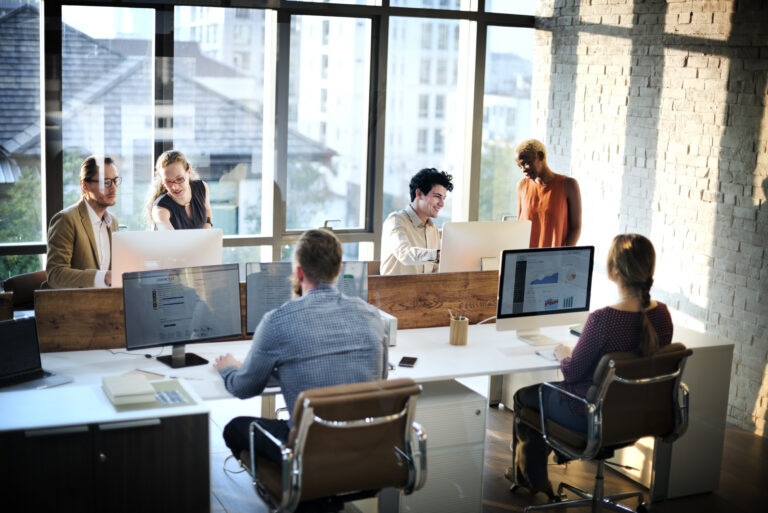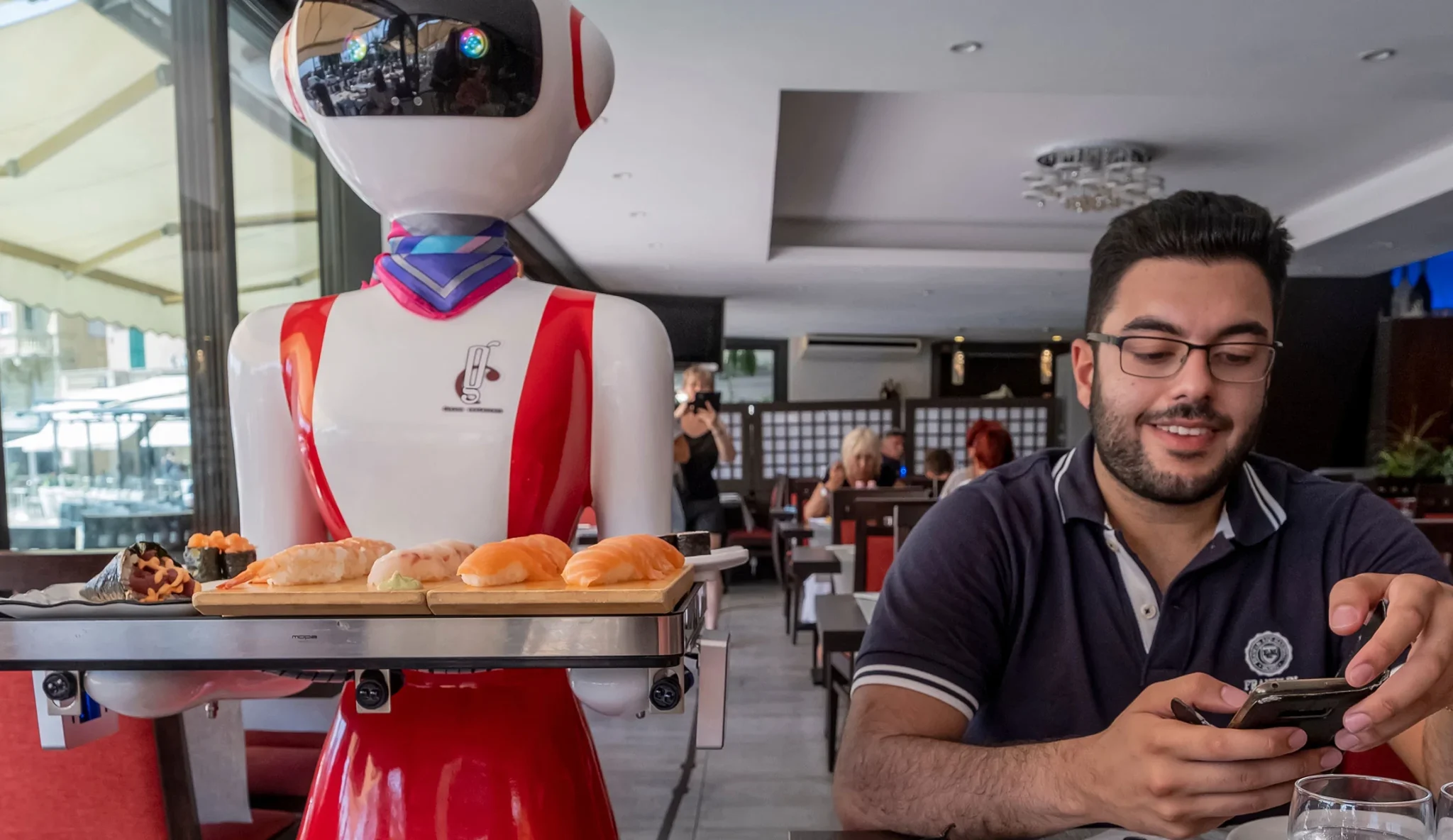How innovation at the Beijing Winter Olympics can inspire change within the UK hospitality industry
At China’s Beijing 2022 Winter Olympics, food is served up to visitors robotically via a completely contactless system.
This ‘robot restaurant’ innovation was introduced in response to the risks of COVID-19, and aims to minimise contact between people. This restaurant can function smoothly and reliably because of an innovative ceiling-based tracking system. Meals are carried directly from the kitchen to athletes and media personnel attending the Winter Olympics via a series of connected overhead robots. To increase safety, there are also transparent shields between diners and a robot arm bartender that handles and dispenses drinks.
If it wasn’t already obvious, we’re living in the future. So, how can hospitality companies in the UK learn from these innovations and combat the challenges facing the industry today?
The key challenges currently faced by UK hospitality
2021 was a tough year again for hospitality, as many businesses were still trying to adjust to life in a global pandemic. In 2022, there remain a few key challenges with which the UK hospitality industry must still contend, namely: staff shortages and hygiene measures.
Shortage of staff
At the moment, too many hotels and restaurants are understaffed. Despite steady gains during 2021, three in four restaurant operators say recruiting and retaining employees is the top challenge facing their business.
The inability to recruit adequate staff has hampered the expansion ambitions of many businesses despite high demand. This has led to reduced operating hours and existing staff have had to shoulder a greater burden. The margins have become tighter. Indeed, hospitality industry data tracker CGA has reported that over 1,000 hospitality sites had closed since July 2021 because of supply chain and staffing challenges.
Increasing hygiene measures due to Covid-19
The pandemic has required all hospitality businesses to alter their hygiene measures. Today, restaurants, hotels and bars are held to higher hygiene standards and must take extra measures to ensure the safety of customers and staff.
This is true in the UK, and in other countries around the world. Back in 2020 there were predictions that new cleaning protocols could cost the hotel industry $9 billion annually.
It is both the cost and the practicalities of implementing these hygiene measures that will challenge hospitality businesses in the future.
Opportunities within hospitality
The Covid-19 Pandemic accelerated a revolution in hospitality. With lifestyle changes being more dramatic than ever, restaurants quickly had to adapt. Technological advances championed such changes – from fine dining to fast food delivery – seeing the way that customers and businesses interact, change significantly. Notably, this change is not temporary, and are likely to mark a permanent transformation to the hospitality industry.
Despite these significant challenges, there remain huge areas of opportunity within UK hospitality. In particular, tech trends within hospitality indicate that exciting developments are already on the way. A host of hospitality businesses are incorporating new tech into their operations, marketing, revenue management and guest experiences.
One example is Just Eat’s partnership with Starship Technologies to focus more on technology and product development to lead innovation in food tech and enhance the customer experience.
Just Eat will test autonomous robots from Starship Technologies designed to assist with deliveries.
Other examples include many hotel chains, like Hilton, embracing IoT technology to provide their guests with sophisticated control over the environment within their rooms. With IoT technology guests can monitor and control the lights, temperature, locks and TV’s.
There are also a number of tech innovations within the hospitality industry that are ideally suited to these pandemic times, including contactless payments, advanced chatbots and robot vacuum cleaners.
Contactless payments make it easier and faster for guests at hotels, resorts, restaurants and bars to pay for whatever they want. They also provide a simple way to keep human-to-human contact to a minimum.
Robots may be the ones helping the Beijing Winter Olympics to run smoothly but it’s chatbots that are helping some UK hotels improve their processes. For example, Edwardian Hotels London operates a concierge chatbot powered by advanced artificial intelligence that interacts with visitors. More recently, companies like Travelodge have also begun to introduce robot vacuum cleaners to assist their housekeeping teams across 579 UK locations.
How Gerald Edelman can help
At Gerald Edelman we offer a variety of services that can assist hospitality businesses looking to innovate and expand. These include:
1. R&D tax credit for hospitality tech businesses
The Coronavirus pandemic has resulted in a variety of challenges for UK hospitality businesses, which led to many of them looking for growth through increased market penetration, innovative product development and new business models. This in turn also helped businesses maintain a stable cash flow through Research and Development (R&D) tax credits to provide some extra liquidity and help secure their futures post-Covid-19.
R&D relief can either be given by an enhanced deduction for corporation tax purposes, or by a payable tax credit. In relation to other global corporate tax reliefs, both types of R&D reliefs are among the most generous.
An additional 130% deduction from profits, subject to corporation tax of qualifying R&D expenditure, pertains the enhanced deduction. With the current tax rate at 19%, this equates to an additional tax saving of 24.7% of such expenditure. For a loss-making company, the expenditure can be carried forward into a future tax year, or can be converted into a repayable tax credit. The credit is equal to 14.5% of 230% of the qualifying expenditure.
We are here to assist you in the process and provide any guidance you may require.
2. Asset financing & leasing
We also have an Asset Financing & Leasing team that will help you get access to new capital and finance for your business. Our Asset Finance team has sourced millions of pounds for our clients, and other third-party companies, and is well positioned to provide expert advice and support to businesses in the hospitality industry. At Gerald Edelman, we can offer a competitive fixed rate over the term of the funding which cannot be called in other than in the event of default. Typical transactions involve vehicles, plant and machinery, IT equipment and software, telecoms, medical equipment, small aircraft and marine equipment. We maintain excellent relationships with a broad network of funders, which enables us to negotiate the most competitive deal for our clients.
3. Raising finance
We can help to secure the finance (both debt & equity, EIS and SEIS scheme) for businesses that are looking to scale up through innovation and green energies.
4. Supply chain sourcing
We can also help companies that are looking for robot facilities like those featured at the Beijing Winter Olympics and we can assist with sourcing from manufacturers based in Asia.
For further guidance speak to our team today.

Let’s get started
Contact page
Contact Us





